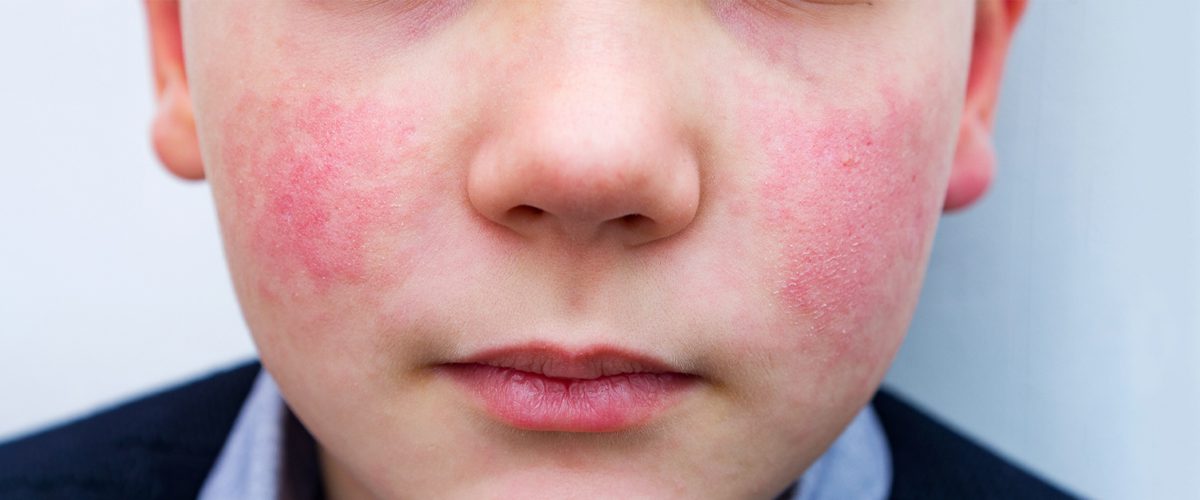What to Know About Parvovirus: Symptoms, Treatments, and Who’s at Risk
Amid an uptick in cases of the virus also known as fifth disease and slapped cheek syndrome, experts explain the symptoms to watch for.

A seasonal respiratory virus known as parvovirus B19 is on the rise, according to a new health warning from the Centers for Disease Control and Prevention. Parvovirus is sometimes called fifth disease or slapped cheek syndrome because of the hallmark symptom of a red facial rash. Data from the alert show an uptick across all age groups, with the largest among children ages 5 to 9.
“The increase in cases could be related to a multitude of factors,” says Dr. Karen Acker, pediatric infectious diseases specialist and hospital epidemiologist at NewYork-Presbyterian Komansky Children’s Hospital and assistant professor of clinical pediatrics at Weill Cornell Medicine. “During COVID, children were also not exposed to parvovirus for a year or two. When you take away the baseline immunity, there’s a large population that’s more susceptible.”

Dr. Karen Acker
Parvovirus is highly contagious and common. About 50% of adults have antibodies by age 20 and 70% by 40, according to the CDC alert. Symptoms are typically mild in children and healthy adults, but pregnant women and people who are immunocompromised are at higher risk.
“Generally, kids do fine, and the majority of the population will be exposed to it at some point during their life,” says Dr. Acker. “But people who are vulnerable should be extra careful to protect themselves.”
Health Matters asked Dr. Acker about parvovirus, how it spreads, and ways to protect yourself.
What are the symptoms of parvovirus?
The first signs are fever, joint pain, and sometimes a sore throat. After a few days of feeling unwell, you break out into a viral rash. The classic parvovirus rash is the “slapped cheek rash,” which is round and on the cheek. The rash can just be on the cheeks or it can spread to the entire body, all the way down to the legs. It varies in its appearance — it can be red, flat dots; raised dots; or lacy.
Is the rash painful?
The rash may look scary, but for the most part, it’s quite benign and painless. Some kids may have a little itchiness, but it’s not a main component of the parvovirus rash. It’s not like hives.
How long does parvovirus last?
The actual illness lasts about a week or less. The rash, however, can come and go for a while. You can be feeling better, and the rash goes away, and then it pops up again weeks to months after the initial infection because of sun exposure or temperature changes.
When are you most contagious?
Parvovirus spreads through respiratory droplets or during pregnancy from mother to fetus. You are most contagious when you have a fever. Once you get the rash, the virus is usually no longer transmissible. As kids go back to school, it’s important to follow school guidelines about them needing to be fever-free for a full 24 hours before returning to the classroom.
How do you treat it?
The treatment is similar to other viruses. Over-the-counter fever reducers, such as acetaminophen (Tylenol) and ibuprofen (Advil, Motrin), can reduce a child’s temperature and make them more comfortable. If the rash is itchy, you can apply hydrocortisone cream.
Who is at high risk?
In rare cases, parvovirus can cause serious health complications including myocarditis, hepatitis or encephalitis. If you are pregnant, it’s important to tell your obstetrician if you’ve been exposed to parvovirus and get tested. People who are immunocompromised — whether from getting chemotherapy or on medication to suppress their immune system — and those with certain types of anemia, especially sickle cell disease, can also be at increased risk for more severe outcomes.
How can you protect yourself?
Go back to the basics. Practice good hand hygiene and keep clean air circulating. Also, you can wear a mask if you’re out in public and concerned about being exposed. Know that we are surrounded by various infections, and it can be scary, but we also have very robust immune systems. Just do the best you can to protect yourself.
Parvovirus in Pregnancy
The CDC recently noted an increase in anecdotal reports from doctors who have seen more than the expected number of cases of parvovirus in pregnant people in the U.S.
Dr. Jessica Scholl, who is a maternal-fetal medicine expert at NewYork-Presbyterian Alexandra Cohen Hospital for Women and Newborns and co-director of the Fetal Care Center at Weill Cornell Medicine, explains what pregnant people need to know about parvovirus.
How common is parvovirus in pregnancy?
Dr. Scholl: Pregnant women are just as susceptible to parvovirus as other healthy adults. Many reproductive age women have preexisting antibodies from a prior infection, indicating protective immunity. In typical years, the incidence of developing an acute parvovirus infection is estimated at 3% to 4% of pregnancies.

Dr. Jessica Scholl
When should a pregnant person contact their OB-GYN?
Pregnant women exposed to someone infected with parvovirus should contact their OB-GYN as soon as possible. Their doctor will want to do blood tests to determine if they are at risk or have protective immunity due to a past infection. Pregnant people should also contact their doctor if they have a fever, muscle or joint pain, flu-like symptoms, or a rash.
How does parvovirus affect pregnant people?
In healthy pregnant women, most infections are very mild and symptoms generally resolve on their own with complete recovery. Many pregnant people have no symptoms at all. If the pregnant mother develops an acute parvovirus infection, there is up to a 30% risk of transmission to the fetus. Most cases of fetal infection will resolve on their own with no adverse outcomes.
However, fetal infection with parvovirus is associated with a 5% to 10% risk of complications, which could include severe anemia of the fetus, extra fluid buildup of the fetus caused by anemia, or pregnancy loss. The risk of complications is greatest if infection occurs between 9 and 20 weeks of pregnancy.
How is parvovirus treated in pregnant people?
Treatment of acute maternal infection is primarily supportive with managing symptoms.
To assess for complications due to fetal infection, ultrasound tests may be recommended to monitor the fetus for signs of anemia. If severe fetal anemia is suspected, fetal blood sampling and an intrauterine blood transfusion may be considered for treatment. In our hospital, we’re not seeing increased rates of cases where the fetus needs treatment.
What are the main takeaways you want parents to understand?
Most cases of parvovirus resolve spontaneously with no adverse maternal or fetal outcomes. However, due to the small risk of fetal complications, we recommend that pregnant people call their OB-GYN if they have been exposed to individuals infected with parvovirus. Be reassured that physicians are experienced in monitoring and treating this condition in pregnancy to provide the best possible outcome.

